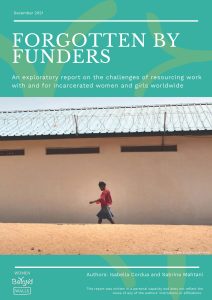Over one million women are controlled by the criminal justice system and over 741,000 women are in prison worldwide. Globally, the number of women in prison is estimated to have increased by about 59 per cent between 2000 and 2020 – a much faster rate than that of men.
Poverty, prior victimisation, discriminatory laws and punitive drug policies are the main drivers behind the alarming increase in women’s incarceration. I’ve had the privilege of working with and for incarcerated women and girls for over 15 years as a human rights lawyer. I’ve witnessed the vibrant activism being done to address these issues, particularly by women with lived experience of the justice system. But it has been disheartening to see the challenges these organisations face, from the UK to Sierra Leone, particularly with funding.
 Women Beyond Walls’ recent exploratory report found that work with and for incarcerated and formerly incarcerated women and girls is desperately underfunded. Forgotten by Funders draws on interviews with a total of 34 small-to-medium-sized organisations working with and for incarcerated women and girls, from 24 countries across five continents, mostly in the majority world. More than half of organisations have women with lived experience of the justice system involved or leading their work.
Women Beyond Walls’ recent exploratory report found that work with and for incarcerated and formerly incarcerated women and girls is desperately underfunded. Forgotten by Funders draws on interviews with a total of 34 small-to-medium-sized organisations working with and for incarcerated women and girls, from 24 countries across five continents, mostly in the majority world. More than half of organisations have women with lived experience of the justice system involved or leading their work.
The report had eight main findings:
1. Established organisations are doing vital work using multiple strategies in a challenging context
‘[Our challenges include] very negative attitudes towards incarcerated people. The severe marginalisation and lack of safety of so many people we work with’.[1]
The organisations surveyed are creating vital change in the lives of women and girls and are changing the legal system through their work: from providing essential legal services and reducing the time women spend in pre-trial detention to abolishing the death penalty. This is a vibrant and innovative area of activism that deserves to be better resourced.
2. Addressing women’s incarceration is not a priority for most donors
‘[There is] lack of interest by funders in issues related to women’s incarceration; those funders that are doing this work in the USA are not interested in supporting such work internationally.’
‘There is generally a negative perception about women in prison or prisoners that make it hard for the society to support [them]. The question of crime is never an interest to most donors or corporate [funders] and many would choose not to associate themselves with prisons.’
The majority of organisations surveyed felt that addressing women’s incarceration was not a priority for most donors who are seeking to fund human rights, women’s rights or access to justice. Available funding opportunities did not sufficiently align with their strategies or areas of work, making it challenging to access funding and sustain their vital work.
3. Over two-thirds of organisations (71 per cent) do not receive funding from feminist and women’s rights funders
‘We have also found that foundations that fund gender-related work are not interested in incarceration issues.’
‘In the broader women’s rights movement it is very difficult to embrace work in prisons and funders exclude such initiatives. They base their argument on the [small] number of women versus the number of men.’
This lack of prioritisation is a reflection of how incarcerated women and girls are far too often left out of mainstream women’s rights and human rights convenings and movements. A prime example was the recent Generation Equality Forum, billed as the biggest convening on women’s rights in the last 25 years. Women’s incarceration did not feature in any of the six action coalitions’ key thematic action areas chosen for the global community to focus on for the next five years. This happened in spite of the relevance of the action coalitions on ending gender-based violence, economic justice and rights and feminist movements and leadership.
4. The majority of organisations lack access to flexible, core funding
‘There’s an increasing recognition that women’s rights organisations require core/flexible funding but there’s not very much out there and it’s very competitive.’
The majority of organisations interviewed received less than 25 per cent of core funding in the last two years. It is well documented that with flexible, unrestricted funding, organisations can self-determine their agendas, respond to changes, seize opportunities, cover their operating costs and invest funds where they are most needed. Providing flexible and sustained core funding is a tenet of feminist funding principles to support the impact and sustainability of women’s rights organisations.
5. Most of the organisations surveyed are facing precarious funding situations
‘Working with imprisoned women and girls is very difficult for us as an organisation and when we don’t get funding support it demoralises us and our team. There are very few organisations working with incarcerated women and girls and with this situation we may not sustain our interventions.’
26 per cent of organisations said they may not be able to operate next year due to lack of funds and 30 per cent said they will have to make cuts but will survive. 79 per cent had reserves or savings of less than six months of their annual budget.
A large proportion of organisations rely on individual donations and fundraising events, which results in unpredictable funding streams.
6. Organisations are facing challenges with the funding process and are not able to fund key staff positions
‘It is challenging to find high calibre staff who will accept the salaries we can offer with the low funds we have – international NGOs make this all the more challenging with the packages they can offer and causes a constant brain drain for the organisation.’
Organisations are facing difficulties such as:
- Challenges with the funding application process;
- Lack of flexibility and onerous requirements from funders with implementation;
- Funders not being willing to adequately fund staff positions, in particular Development or Monitoring and Evaluation staff, which were seen as critical to operational effectiveness and to secure further funding.
7. Organisations receive insufficient funding to fully implement all their strategies, particularly their work with women and girls post-incarceration
‘Sometimes we have to be committed to what donors decide to support even if we have the ability to identify the priority/ies of work in terms of women and girls’ issues as we are the ones who are working on the ground and have the ability to reflect the real need to be worked on.’
88 per cent of participants said there were strategies they would like to implement but could not do so effectively because of lack of funding. 56 per cent of participants said they would like to undertake strategies that donors will not fund. In particular, post-incarceration support was challenging to fund.
8. Organisations are also in need of non-financial support for sustainability
‘We need connections to funding and networking with organisations in the criminal justice system.’
Organisations are also in need of non-financial support, such as technical assistance or leadership support, in order to improve organisational development and create more robust and sustainable organisations. Organisations working with and for incarcerated women are often left out of mainstream women’s rights or human rights movements and convenings. This deprives them of networking and partnership opportunities, as well as learning and exchanging different strategies and ideas.
Recommendations
This moment – with more global attention on resourcing for gender equality – presents a critical opportunity to address the longstanding neglect of work with and for incarcerated women and girls. Feminist and women’s rights funders, as well as other donors, should listen to the views and challenges of organisations working in this space, especially to women with lived experience, and consider how they plan to address issues around incarceration within their women’s rights and gender justice strategies. The report presents several recommendations to support this:
1. Resource a global mapping of organisations and unregistered groups working with and for women and girls impacted by the criminal legal system. Listen to organisations working in this area and women with lived experience of the criminal legal system, to shape funding priorities and interventions.
2. Dedicate new funding for work with and for women and girls impacted by the criminal legal system. Ensure that the funding is accessible.
- Create explicit open call processes.
- Simply funding requirements
- Partner with women’s funds and public foundations that have the capacity and expertise to work with small and/or unregistered groups.
3. Increase and prioritise feminist funding for work with and for women and girls impacted by the criminal legal system.
4. Improve the quality of funding for organisations working with and for women and girls impacted by the criminal legal system.
- Provide flexible and unrestricted funding that allows organisations to pursue their own agendas.
- Build multi-year partnerships that allow organisations to do long-term strategic work.
- Support organisations to build reserves to allow for sustainability.
5. Increase non-financial support to organisations working with and for women impacted by the criminal legal system, contributing to their sustainability.
6. Invest in movement building, networking initiatives and shared learning between organisations working with and for women and girls impacted by the criminal legal system, as well as with the wider women’s rights movement and human rights movement. In particular, support learning with and from women with lived experience of the criminal legal system.
Forgotten by Funders was drafted by Isabella Cordua and Sabrina Mahtani, with assistance from Laura Cook, Victoria Lin and Kallista Jayasuriya. Thank you to all the organisations who contributed to this research.
Sabrina Mahtani curates Women Beyond Walls, a movement-building platform amplifying voices to end the over-incarceration of women. worldwide



Comments (1)
These women were also victims. A growing up girl should be educated enough of the threat in society in able to be aware of challenges that she will face when she becomes a woman. This does not happen to everybody, but prevention is better than cure.